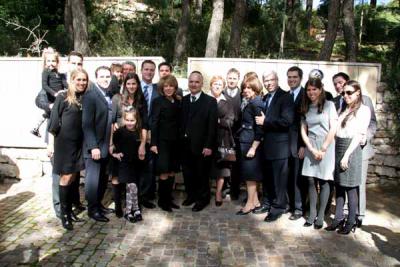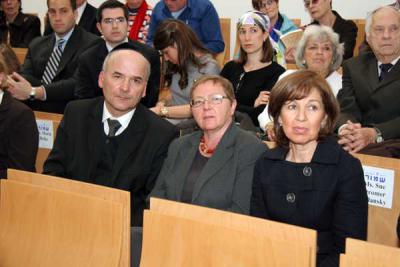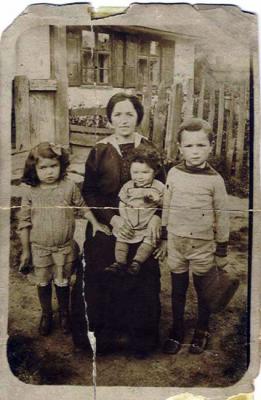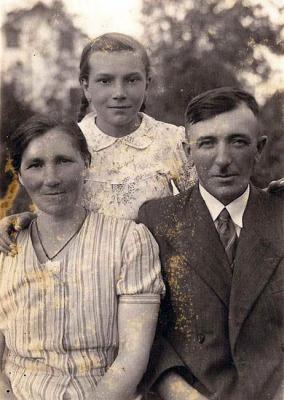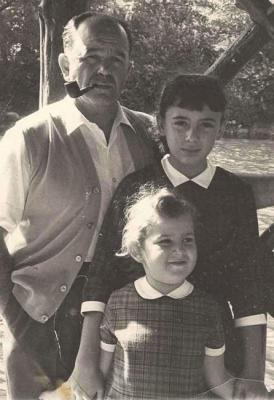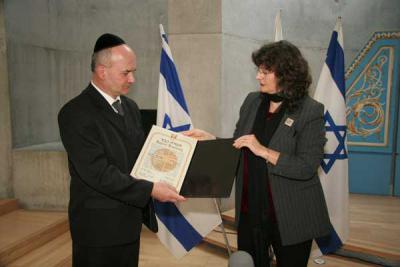
Stanislaw Briks receiving the certificate of honor from Director of the Righteous Among the Nations Department Irena Steinfeldt
17 February 2008
(February 17, 2008 - Jerusalem) In a moving ceremony recently held at Yad Vashem the title of Righteous Among the Nations was posthumously bestowed upon Jozef and Rozalia Streker of Poland.
The ceremony took place in the presence of Stanislaw Briks, grandson, and Eugeniusz Piatek, great-grandson of Jozef and Rozalia Streker, both from Poland; Sue Stromer Talansky and Nina Gaspar, of the USA, daughters of Moty Stromer; Polish Ambassador to Israel Agnieszka Magdziak-Miszewska and Ms. Irena Steinfeldt, Director of the Righteous Among the Nations Department.
Upon accepting the medal and certificate of honor on behalf of his grandparents, Mr. Stanislaw Briks said: “My grandparents were quite modest people. My grandmother was a very religious person; she had always told that we are all children of one God. Their strong faith in God helped them not to hesitate to give a man of Jewish origin, Mr. Marek (Moty) Stromer, a helpful hand.”
In addition to the recognition ceremony the launch of Moty Stromer’s diary (written while in hiding while at the Streker’s farm) also took place. The diary Memoirs of an Unfortunate Person was translated into English from its original Yiddish as part of Yad Vashem’s Holocaust Survivors’ Memoirs Project. Dr. David Silberklang, Editor-in-Chief of Yad Vashem Publications spoke about the unique diary and its historical significance. For more information about the diary, please contact:publications.marketing@yadvashem.org.il
The Rescue Story
Moty (Marek) Stromer was born in Kamionka-Strumilowa, near Lvov, Poland, in 1910. The Stromers had a liquor business in Kamionka, and also ran a small retail business in the town. Moty worked in the family business, and lived in Kamionka with his parents, siblings and extended family until the outbreak of the war.
When the Nazis invaded Kamionka in 1941, Moty was 31 and about to become engaged to Pepi Haberkorn. The planned wedding was never to take place. Soon their lives, the family and the community were to be destroyed forever. Shortly after the German occupation, Moty Stromer’s grandfather Reuven and his great uncle Chaim-Hersh were brutally murdered.
Moty fled to Lvov, where he was incarcerated in the ghetto with his married sister Zlata, his brother-in-law Mechel Eisen and their children. From there Moty was sent to the Janowska forced labor camp.
All Stromers in Poland, the entire family with the exception of Moty, were murdered: his mother Gittel, his father Shaul, his sister Zlata and her family, his fiancée Pepi, his grandparents, aunts, uncles, and cousins. Moty managed to escape and headed back to Kamionka, where he found refuge at the farm of Jozef and Rozalia Streker, ethnic Germans (Volksdeutsche) living with their daughter Helen in a rural area called Jagonia. Josef Streker had been a regular customer of the Stromers before the war, and had even once borrowed some money from his Jewish business acquaintances. Now it was Stromer who was desperately in need of help. Other acquaintances of his had turned him down and wouldn’t let him into their homes, but when he came knocking on Streker’s house, he was invited in, given milk and bread and a big coat to warm himself.
The Strekers hid Moty in the attic of one of their barns, and took care of all his needs. Every day, Rozalia brought him food. Moty was grateful for any task that would provide a distraction from his daily tedium. To keep him busy, the Strekers also brought Moty a blank ledger book and a pencil, and he began to write a diary-memoir – a poignant document describing his experiences since the beginning of the war. In his diary he describes the terrible fear – his own and his rescuers’. For hiding Moty placed the Strekers in grave danger – from the Germans, from their neighbors, from nationalist partisans. The danger was present and became part of their lives. Sometimes their resolve wavered, but they let Stromer stay on. He remained hidden in the attic from the Summer of 1943 until the Spring of 1944, almost a whole year. As the Russian front moved closer, the Strekers had to abandon the farm and move westwards. They too had become refugees.
Moty kept in contact with the Strekers after the war. The contact was maintained with their daughter Helena even after they passed away.
In its meeting of February 18, 2007, the Commission for the Designation of the Righteous Among the Nations at Yad Vashem, decided to award Jozef and Rozalia Streker the title of Righteous Among the Nations.




